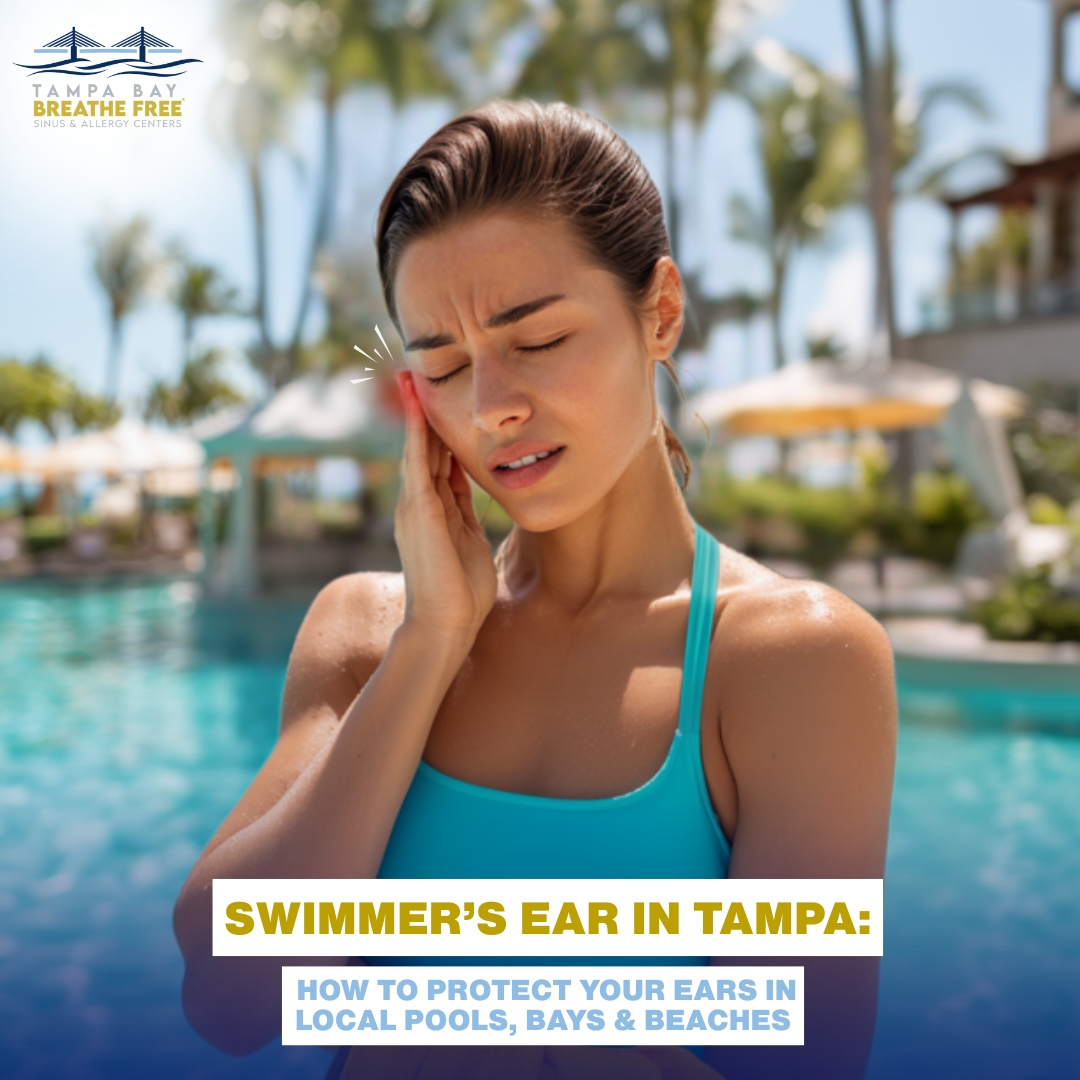.png)
Swimmer’s Ear in Tampa: How to Protect Your Ears in Local Pools, Bays & Beaches
Swimming is a favorite activity in Tampa, thanks to our beautiful beaches, backyard pools, splash pads, and warm year-round climate. But there’s one common downside: swimmer’s ear—a painful outer ear infection that can sneak up fast.
If you or your child frequently swims and ends up with ear pain, swimmer’s ear may be the cause. The good news? It’s often preventable with the right care and attention.
Let’s take a look at what swimmer’s ear is, why it’s common in the Tampa Bay area, and how to keep your ears healthy while still enjoying the water.

What Is Swimmer’s Ear?
Swimmer’s ear (also called otitis externa) is an infection of the outer ear canal—the passage that leads from the outside of the ear to the eardrum. It differs from middle ear infections, which are more commonly linked to colds or sinus infections.
This type of infection often develops when water becomes trapped in the ear canal, creating a moist environment where bacteria or fungi can grow. This risk increases in Tampa’s humid climate, where ear canals may stay damp longer.
Where Tampa Swimmers Often Get Swimmer’s Ear
With so many great swimming spots in Tampa, exposure to water is frequent—and not always sterile. Swimmer’s ear can happen after time in:
- Public or backyard swimming pools
- Gulf Coast beaches and saltwater bays
- Lakes, rivers, and freshwater springs
- Splash pads and water parks
Even clean-looking water can harbor microorganisms—especially if the ear doesn’t dry properly afterward.
Early Signs of Swimmer’s Ear
Recognizing symptoms early may help prevent complications. Be on the lookout for:
- Itchy ears after swimming
- Redness or swelling in or around the ear canal
- Pain when tugging the ear or touching the outer ear
- A sensation of fullness or blockage
- Clear or yellowish ear drainage
- Reduced hearing
If symptoms worsen—especially if pain spreads to the face or neck, or you develop a fever—see an ENT provider promptly.
How to Help Prevent Swimmer’s Ear in Tampa
You don’t have to avoid swimming to protect your ears. Here are some easy steps that may reduce your risk of infection:
✅ Dry Your Ears After Swimming
Tilt your head side to side to help water drain out, and gently dry your outer ears with a clean towel. Avoid inserting cotton swabs or objects into the ear canal, as this may cause irritation or injury.
✅ Use Swim Earplugs
Custom or over-the-counter swimming earplugs can help block water from entering the ear canal. They’re great for children or adults who swim frequently.
✅ Avoid Stagnant or Dirty Water
Water that smells foul, looks cloudy, or hasn’t been properly filtered may contain more bacteria. If you’re unsure, it’s best to skip that swim.
✅ Don’t Scratch or Pick at Your Ears
Scratching the inside of your ears (even with fingers or Q-tips) can lead to micro-abrasions, increasing the risk of infection.
✅ Ask Your Doctor About Ear Drops
Some over-the-counter ear drops are designed to dry excess moisture after swimming. However, consult a healthcare provider before using them—especially if you’ve had ear tubes, ear surgery, or chronic ear infections.
Local ENT Care for Swimmer’s Ear in Tampa
If you or your child is experiencing ear pain after swimming in Tampa’s pools, bays, or splash zones, don’t wait for symptoms to worsen. At Tampa Bay Breathe Free, we help families across the region prevent and treat ENT conditions—including swimmer’s ear.
Whether you're managing early symptoms or a more persistent case, our team provides evidence-based care to help you feel better—so you can get back to enjoying the water without discomfort.
Protect your ears. Enjoy the beach. Give us a visit.
The information provided in this article is for informational and educational purposes only and does not constitute medical advice. It is not intended to diagnose, treat, cure, or prevent any disease or medical condition. Always seek the guidance of your physician or other qualified healthcare provider with any questions you may have regarding a medical condition or treatment.
Results may vary: Treatment outcomes and health experiences may differ based on individual medical history, condition severity, and response to care.
Emergency Notice: If you are experiencing a medical emergency, call 911 or seek immediate medical attention.




